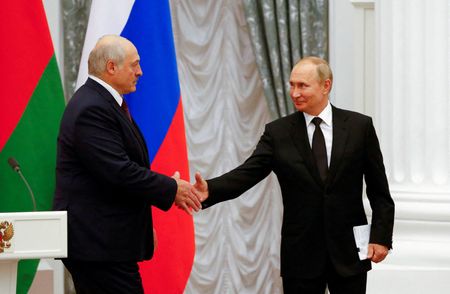
Factbox-Russian military drills in Belarus create new threats for Ukraine

By Tom Balmforth
MOSCOW (Reuters) – Joint military exercises https://www.reuters.com/world/europe/russia-belarus-plan-joint-military-drills-february-lukashenko-2022-01-17 between Russia and Belarus in the coming weeks will provide Russian President Vladimir Putin with new options if he decides to attack Ukraine and will further stretch that country’s defences, military analysts say.
The “Allied Resolve” manoeuvres will take place near Belarus’ western border with NATO members Poland and Lithuania and its southern border with Ukraine. Russia already has tens of thousands of troops to the north, east and south of Ukraine, although it denies any intention to invade.
NEW FRONT, NEW THREATS
The deployment of Russian forces in Belarus creates a new potential front line for Ukrainian army planners to worry about, said Konrad Muzyka, director of the Poland-based Rochan consultancy. Reinforcing that area will mean spreading troops thinner elsewhere and diverting forces from positions facing southwest Russia, the Russian-backed Donbass region in eastern Ukraine that Kyiv lost control of in 2014 and the Crimean peninsula that Russia seized from Ukraine that year. “They don’t have enough manpower so they’ll have to make choices,” said Muzyka.
From Belarus, Russian troops would be much closer to Ukraine’s capital Kyiv – the distance from there to the border with Belarus is just over 90 km (56 miles) at its closest point. If Russia deploys long-range multiple-launch rocket systems to Belarus, they would be able to strike targets near Kyiv without even entering Ukraine, said Rob Lee, a military analyst and a fellow at the U.S.-based Foreign Policy Research Institute.
Moscow could also deploy electronic warfare systems from Belarus to try to disrupt communications out of Kyiv, including radar or satellite, if Russia invaded, Lee said.
WHAT MINSK AND MOSCOW ARE SAYING
Belarus and Russia say the drills will take part in two phases and practice repelling an external attack. Belarusian leader Alexander Lukashenko said the drills were needed because of military buildups in Ukraine, Poland and the Baltic states.
The first phase, focused on rapidly redeploying forces, organising the defence of important sites, border defence and assessing air defence capabilities, is already under way and will run until Feb. 9. The second phase from Feb. 10-20 will focus on reinforcing sections of the state border against infiltration by armed groups or arms deliveries, and finding and destroying illegal armed formations and enemy sabotage and reconnaissance groups.
WHAT’S BEING DEPLOYED
Belarus said on Monday that Russian forces were already arriving. Hardware is being transported to Belarus by rail from Russia’s Eastern Military District thousands of miles away, the Defence Ministry’s Zvezda TV channel said. Russia said on Tuesday that 12 SU-35 fighter jets, two divisions of S-400 air defence systems and a division of Pantsir-S air defence systems were being transported.
It’s not publicly known what forces and hardware will be deployed in total. Belarus state media have shown train loads of equipment arriving.
Muzyka said he believed that from seven to 10 battalion tactical groups, which typically number between 700-900 troops, had recently left Russia’s Eastern Military District. He said it would be logical for them to be deployed in the same place – in this case Belarus – due to their single command structure.
Basing estimates on open-source intelligence analysis, he said it looked like the hardware being transported was mostly accompanied by a skeleton staff, including people needed for maintenance on the vehicles in the field.

















POST COMMENTS (0)